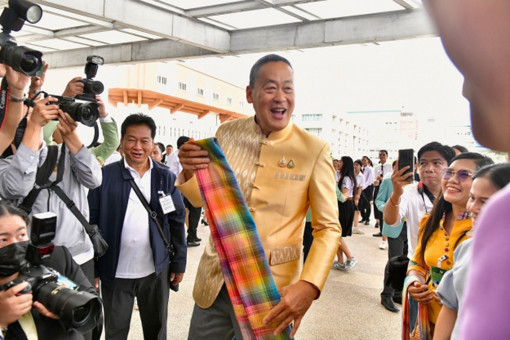Struggling restaurants ask government to lift afternoon ban

NAKHON RATCHASIMA – The government has promised to consider lifting the afternoon ban on alcohol sales to help ease the plight of restaurant operators who say the poor economy is starting to hurt them.
Representatives of the Restaurant Business Club on Tuesday handed Prime Minister Srettha Thavisin a letter asking the government to help restaurants survive tough economic times.
They said operating costs and prices of ingredients continued to rise even as the economy was faltering, forcing many businesses to close down.
One of the measures they are calling for is an end to a 52-year-old rule that prohibits sales of alcohol between 2pm and 5pm.
“I will consider it [the lifting of the afternoon ban on alcohol sales] … The government is trying to promote tourism, hoping they will also earn more income,” Mr Srettha said on Tuesday, referring to restaurant operators.
He made the remarks as the cabinet gathered for a mobile meeting on Tuesday at Nakhon Ratchasima Rajabhat University.
Sorathep Rojpotjanaruch, head of the Restaurant Business Club, said the group wanted the government to introduce urgent relief measures before more businesses close down.
Operating costs have increased by 50% while prices of ingredients such as milk, eggs and vegetables have risen by 20-30%, he said.
“The economy has been sluggish, and consumer purchasing power has declined. The cost and prices of ingredients, such as vegetables, have gone up, on top of expensive electricity fees,” he said.
In 2019, restaurant businesses nationwide earned an estimated 420 billion baht in combined revenue, about 7% of gross domestic product (GDP). This revenue was initially expected to grow by another 4-5% this year. But since April, growth has slowed, and restaurants continue to close, Mr Sorathep said.
“Small-scale vendors and food shops along streets are at risk of going out of business as they don’t have sufficient financial resources to stay afloat for long periods,” he said.
In addition to lifting the afternoon alcohol sales ban, Mr Sorathep said the group proposed reducing the building and land tax rates to ease the burden on businesses.
Members also want the government to devise measures to help businesses run by small and medium-sized enterprises, he said.
For example, he said, customers who ask for tax invoices from restaurants could be allowed to claim up to 20,000 baht in tax deductions, while business operators could use the bills for tax deductions of up to 100,000 baht each.
Another proposal is a cash handout to give people 2,000 baht each to spend over a three-month period — but only on food through the Pao Tang app, said Mr Sorathep.
The ban on retail sales of alcohol between 2pm and 5pm is not covered in the Alcoholic Beverage Control Act. It was announced by the coup regime of Thanom Kittikachorn in 1972 to deal with officials drinking during work hours, and has never been rescinded.

